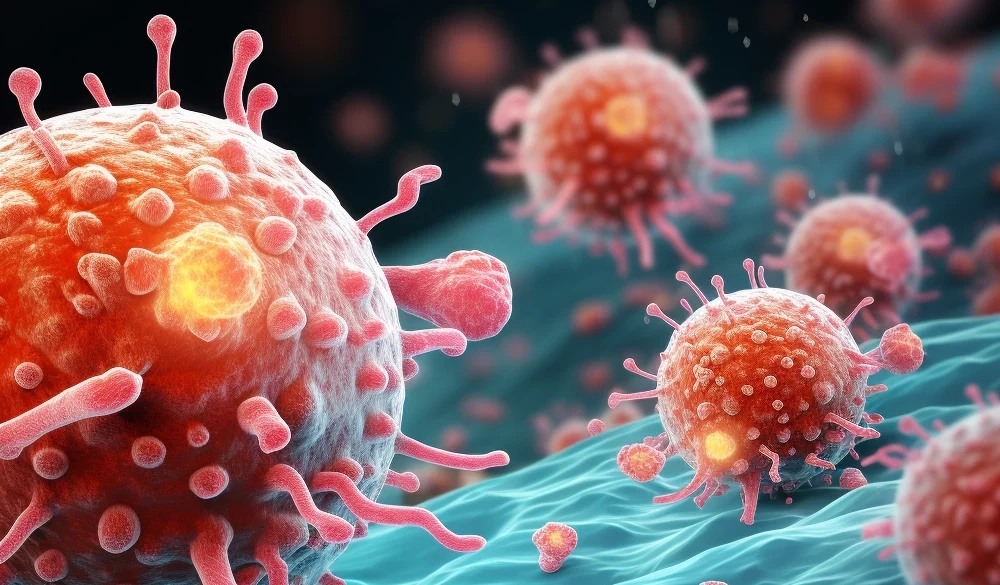Fenbendazole, originally designed as a potent deworming agent targeting parasites, has emerged as a surprising contender in the realm of cancer treatment. The revelation that this drug, along with other benzimidazoles, exhibits effects against tumor cells has sparked a new avenue of research and potential therapeutic applications. In this article, we look at the intricate mechanisms through which fenbendazole engages with cancer cells. We will explore its role in inducing apoptosis, inhibiting glucose uptake, and reactivating the p53 gene. Additionally, the unique characteristics that set it apart in the landscape of cancer therapies.
1) Apoptosis Induction through β-Tubulin Interaction:
Fenbendazole’s journey into the realm of cancer treatment begins with its interaction with β-tubulin. That is a structural protein crucial for the synthesis of microtubules. This interaction leads to cell cycle arrest and cytotoxic effects, ultimately inducing apoptosis in cancer cells. The inhibition of polymerization of tubulin into microtubules has been well-documented in both helminths and human tumor cells. This showcases fenbendazole’s ability to disrupt essential cellular processes. The apoptotic cascade triggered by fenbendazole represents a promising avenue for targeted cancer therapy. (Source1, Source2)

2) Inhibition of Glucose Uptake in Cancer Cells:
A hallmark of cancer cells is their voracious appetite for glucose, a phenomenon known as the Warburg effect. Fenbendazole steps into this metabolic battlefield by limiting cancer cells fueled with sugar. It achieves this by reducing glucose uptake. It also decreases the abundance of GLUT transporters responsible for transporting glucose into cancer cells and inhibiting hexokinase 2, a key enzyme vital for cancer cell survival. By disrupting these metabolic processes, fenbendazole presents a novel strategy to starve cancer cells of their energy source. (Source1, Source2)
3) Reactivation of the p53 Gene:
The p53 gene, often referred to as the “guardian of the genome,” plays a pivotal role in suppressing tumor formation. Fenbendazole’s potential to reactivate the p53 gene represents a significant mechanism in its anti-cancer effects. This aspect is still under exploration and subject to further studies. Emerging evidence suggests that fenbendazole may indeed enhance the expression of p53, the strongest tumor suppressor in the human body. This holds particular intrigue given the role of p53 in regulating cell division and preventing the formation of cancerous cells. (Source)

Unique Characteristics of Fenbendazole in Cancer Treatment:
Resistance Prevention:
- One remarkable aspect that sets fenbendazole apart is its ability to thwart the development of resistance in cancer cells. Unlike many chemotherapy and biological therapy medications that cancer cells can adapt to over time, fenbendazole remains effective. The drug is not a target for P-glycoproteins, special drug efflux pumps that cancer cells often employ to excrete anti-cancer drugs. This lack of susceptibility to drug efflux mechanisms means that fenbendazole can be taken continuously, making it a potential long-term strategy against cancer. (Source)
Sensitization to Radiotherapy:
- Fenbendazole’s potential to sensitize tumors to radiotherapy adds another layer of versatility to its application. Similar to chemotherapy agents from the taxane group, fenbendazole enhances the sensitivity of cancer cells to radiation treatment. This suggests a potential synergistic effect when combining fenbendazole with radiotherapy, opening avenues for more effective and targeted cancer treatment strategies. (Source)

Conclusion:
In the evolving landscape of cancer research and treatment, fenbendazole emerges as a multifaceted player with diverse mechanisms against cancer cells. From inducing apoptosis through β-tubulin interaction to inhibiting glucose uptake and potentially reactivating the p53 gene, fenbendazole showcases a spectrum of anti-cancer effects.
Moreover, its unique characteristics, such as the prevention of resistance development in cancer cells and the potential to enhance the effectiveness of radiotherapy, position fenbendazole as a remarkable candidate in the arsenal against cancer. As research progresses, unlocking the full therapeutic potential of fenbendazole requires continued exploration, clinical validation, and a nuanced understanding of its interactions with various cancer types.
Fenbendazole’s unexpected journey from dewormer to a potential cancer treatment underscores the importance of reimagining existing drugs and their applications in the pursuit of innovative and effective cancer therapies.
Recent Posts
- Drug Repurposing in Cancer Treatment: Context and the Case of Fenbendazole
- Fenbendazole: More Than Just a Dog Dewormer?
- Mel Gibson Tells Joe Rogan Fenbendazole & Ivermectin ‘Cured’ Stage Four Cancer: Exploring Alternative Treatments and Rising Evidence
- Exploring the Synergy of Fenbendazole in Cancer Care: Insights and Integrative Approaches
- The Emerging Role of Fenbendazole in Cancer Treatment: Miracle Drug or Misplaced Hype?






